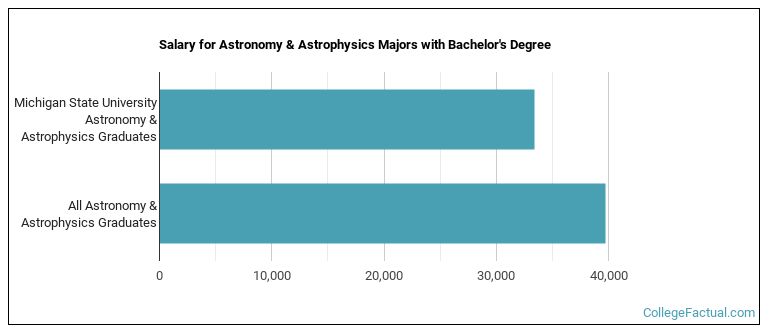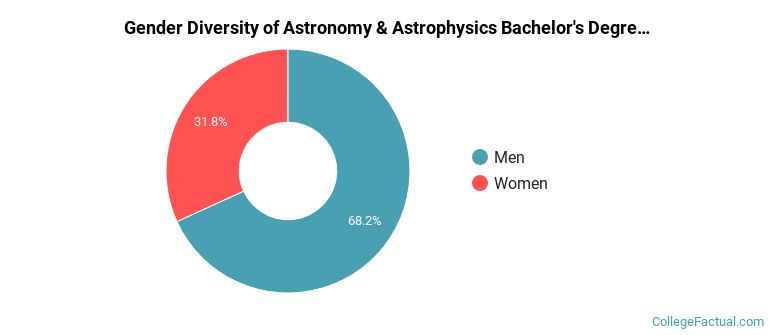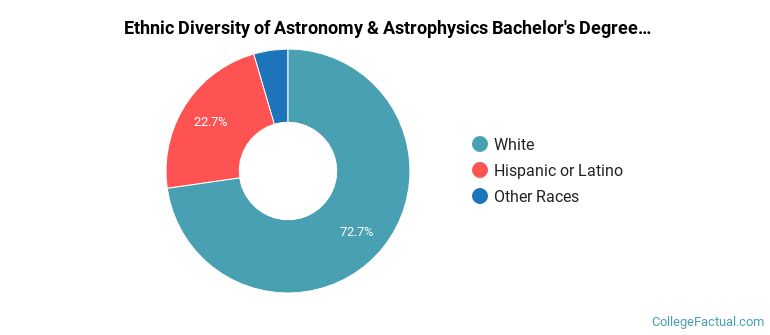 by our College Data Analytics Team
by our College Data Analytics TeamHere, you'll find out more about the major, including such details as the number of graduates, what degree levels are offered, ethnicity of students, average salaries, and more. In addition, we cover how Michigan State ranks in comparison to other schools with astronomy programs.
Jump to any of the following sections:
The bachelor's program at Michigan State was ranked #21 on College Factual's Best Schools for astronomy list. It is also ranked #2 in Michigan.
| Ranking Type | Rank |
|---|---|
| Best Astronomy & Astrophysics Bachelor’s Degree Schools | 21 |
| Best Astronomy & Astrophysics Schools | 21 |
During the 2021-2022 academic year, Michigan State University handed out 22 bachelor's degrees in astronomy & astrophysics. This is an increase of 47% over the previous year when 15 degrees were handed out.
In 2022, 3 students received their master’s degree in astronomy from Michigan State. This makes it the #18 most popular school for astronomy master’s degree candidates in the country.
In addition, 4 students received their doctoral degrees in astronomy in 2022, making the school the #17 most popular school in the United States for this category of students.
Astronomy majors who earn their bachelor's degree from Michigan State go on to jobs where they make a median salary of $33,373 a year. This is less than $39,728, which is the national median of all astronomy majors in the nation who earn bachelor's degrees.

During the 2022-2023 academic year, part-time undergraduate students at Michigan State paid an average of $1,457 per credit hour if they came to the school from out-of-state. In-state students paid a discounted rate of $564 per credit hour. The following table shows the average full-time tuition and fees for undergraduates.
| In State | Out of State | |
|---|---|---|
| Tuition | $16,930 | $43,700 |
| Fees | $340 | $340 |
| Books and Supplies | $1,334 | $1,334 |
| On Campus Room and Board | $11,754 | $11,754 |
| On Campus Other Expenses | $3,592 | $3,592 |
Learn more about Michigan State tuition and fees.
In the 2021-2022 academic year, 22 students earned a bachelor's degree in astronomy from Michigan State. About 32% of these graduates were women and the other 68% were men.

The majority of bachelor's degree recipients in this major at Michigan State are white. In the most recent graduating class for which data is available, 73% of students fell into this category.
The following table and chart show the ethnic background for students who recently graduated from Michigan State University with a bachelor's in astronomy.

| Ethnic Background | Number of Students |
|---|---|
| Asian | 0 |
| Black or African American | 0 |
| Hispanic or Latino | 5 |
| White | 16 |
| Non-Resident Aliens | 0 |
| Other Races | 1 |
Online degrees for the Michigan State astronomy bachelor’s degree program are not available at this time. To see if the school offers distance learning options in other areas, visit the Michigan State Online Learning page.
Take a look at the following statistics related to the make-up of the astronomy majors at Michigan State University.
| Related Major | Annual Graduates |
|---|---|
| Physics | 93 |
| Chemistry | 75 |
| Geological & Earth Sciences | 18 |
| Materials Sciences | 8 |
More about our data sources and methodologies.